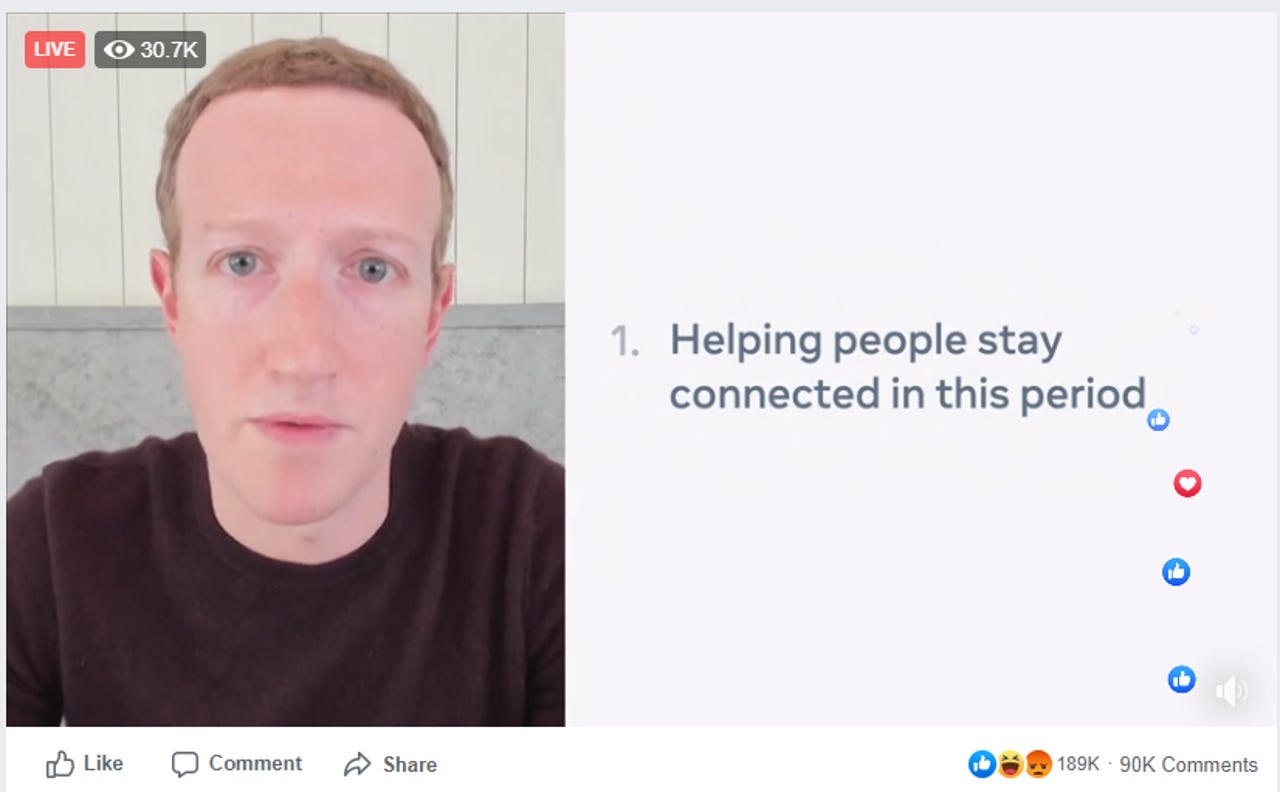Facebook's Messenger Rooms aims to be the social version of Zoom


Facebook on Friday announced a series of new video products, including Messenger Rooms, a consumer-focused video conferencing tool. The new product takes many cues from enterprise tools like Zoom while trying to correct for some of their shortcomings.
Video presence has "emerged as especially important" during the COVID-19 pandemic, CEO Mark Zuckerberg said in remarks streamed on Facebook Live.
"There are a lot of different uses for video presence. There are professional uses, which is a lot of what we've focused on and come to rely on during this period, but in a lot of ways there are even more social uses," Zuckerberg said. "And there are a lot of different products that need to get built because the use cases are sometimes subtly, and sometimes not-so-subtly different in ways that require different products to optimize and enable people to do what they want."
The CEO identified three distinct product categories: video calling, video rooms, and live video.
Video rooms enable users to create a link to a virtual space where other users can drop in.
"This is a newer model popularized by enterprise video conferencing tools," Zuckerberg said. With Messenger Rooms, he said, Facebook aims to "have the leading video rooms product for social uses cases."
Messenger Rooms lets users create a "room" from Messenger or Facebook and invite anyone to join, regardless of whether they have an account on Facebook or any other Facebook-owned platforms. Rooms will eventually be able to hold up to 50 people with no time limit.
While enterprise tools like Zoom typically require scheduling a meeting ahead of time, Messenger Rooms lets you share rooms on Facebook through the News Feed, or with Groups or Events, enabling people to just drop in.
"We're making it very easy to get the people you want into a room," Zuckerberg said. At the same time, he added, "It's really important to make sure that annoying people or problematic people don't join."
Users can create private rooms only accessible via a link. However, even if a user creates a room open to all of their friends, not all of their "friends" will see it. "We're still, in the back end, going to start off by showing it to the subset of people that you actually interact with on our services or you've shown some interest in interacting with," Zuckerberg said.
While Zuckerberg highlighted the new product's privacy and security features, Rooms is not end-to-end encrypted.
"While there are significant challenges to providing end-to-end encryption for video calling with large groups of people, we're actively working toward this for Messenger and Rooms," Facebook Chief Privacy Officer Erin Egan wrote in a blog post.
Egan said Facebook's security team has made Rooms links "difficult for hackers to guess" by adding a string of random characters and digits at the end, with numbers and letters in different cases. A new link is generated every time you create a room.
Along with trying to keep hackers out, "We don't watch or listen to your audio or video calls," Egan wrote.
That said, she noted, Facebook collects data from Rooms for the purpose of improving the product experience. She said the data is not used to inform ads.
Users can adjust the privacy of a room by kicking people out or locking the room.
"We've been very careful about trying to learn the lessons of how we've seen other people trying to misuse other video conference and video presence tools during this period," Zuckerberg said.
The tool is rolling out in some countries this week with the rest of the world seeing it in the coming weeks. While it will be natively hosted in Messenger, it will be launching across all of Facebook's apps and across its Portal devices.
Meanwhile, in the product category of "video calling," Zuckerberg announced that WhatsApp users will soon be able to make group voice and video calls with up to eight people, up from four. These calls are secured with end-to-end encryption.
Messenger and WhatsApp are already dominant players in the category of "video calling" products, Zuckerberg said -- describing this as products best suited for one-on-one, ad hoc calls. He also noted that Facebook's Portal devices have become more popular during the pandemic. Sales of Portal devices have grown by more than 10x, he said.
Facebook is also rolling out new features in the category of "live video," including tools to help small businesses collect revenue. Companies will be able to use their Facebook Page to charge for access to Facebook Live videos, so they can collect fees for streamed events such as online classes or performances.
Additionally, Facebook is making it easier to access a live event, regardless of one's internet connection, by giving the option to listen to audio-only. Additionally, users without a Facebook account will be able to access most public live videos on the web. Some Pages will be able to share a toll-free number to let users listen to audio via the telephone.
Facebook is also reviving Live With, enabling users to add another person into a live video.
Zuckerberg on Friday also spoke at length about the steps Facebook is taking in response to the pandemic, such as canceling live events for the next year. "I hope this live stream thing works because I have a feeling we're going to be doing it this way for a while," he said.
PRIOR AND RELATED COVERAGE:
- Best video conferencing software for business: Microsoft Teams plus eight more Zoom alternatives
- Google: Here's how Google Meet beats 'zoombombing' trolls
- Google to Gmail users: Coronavirus phishing is targeting you. This is how we hit back
- Zoom security: Your meetings will be safe and secure if you do these 10 things